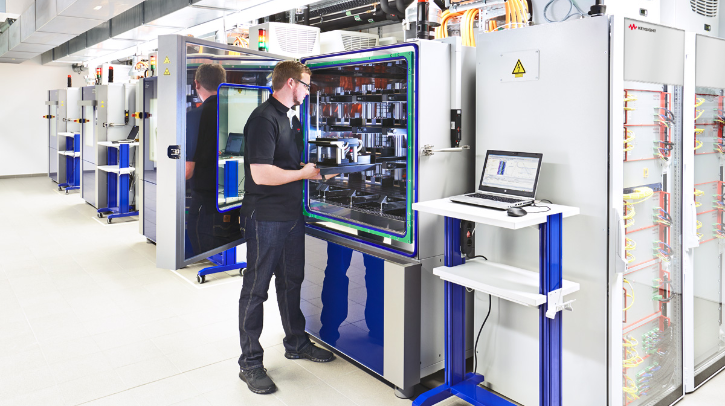Battery design: The epicenter of the EV ecosystem
Transitioning from gas-powered internal combustion engines (ICE) to clean energy electric vehicles (EVs) involves significant technological investments to make EVs accessible to the broader market.
Government legislation to eliminate or limit the production of ICEs by 2035 is driving a surge in the demand for the EV ecosystem. This demand, in turn, creates the need for more efficient ways of testing EV batteries.
At the heart of the increase in EV market demand is the battery — the subsystem of EVs that makes a sustainable electrified transportation system possible.
The goal is to develop batteries that improve durability, power density and operational safety using a fast, cost-effective and energy-efficient process.
One important aspect of battery design is performance testing. It is a critical process that includes the design, production and system integration phases to ensure that all batteries entering the open market are of the highest quality for safety and operational performance.
EV battery testing can be expensive and time-consuming without the latest systems and methodologies. Using best practices and state-of-the-art technologies throughout the battery design process can help you quickly and easily resolve battery design challenges.
This article will explore the following:
- How investing in end-to-end EV battery test systems can improve the quality and performance of EV battery designs.
- How improving time to market and decreasing operational costs is enabled by these systems without compromising range performance, power density and safety.
Improve time to market
Testing and verifying EV batteries is integral to ensuring performance and safety when a product enters the marketplace. Thorough testing during the research and development (R&D) phase can also improve time to market and cost efficiencies. Performing in-house testing and identifying performance issues can improve time-to-market for the EV battery supply chain.
Perform in-house testing
Test houses are busier than ever, so wait times are longer, and designers are experiencing delays. Relying on external test facilities can add weeks to your development time frame, putting you at a disadvantage against the competition.
Purchasing in-house test equipment can keep testing wait times to a minimum. Scheduling in-house test appointments will reduce the time it takes to receive a complete performance data set for your latest prototype.
While the capital investment requirements for such equipment may seem prohibitive, the time savings can deliver a substantial return on investment at a time when competition is increasing.
Identify performance and safety issues
It is essential to consider the impact of poor performance. Omitting non-compulsory testing can lead to performance or safety issues that go undiscovered. The process of recalling a product further down the production process is costly. The time it takes to rectify the issue significantly affects the timeline for bringing a fully operational version to market. In a market evolving at such a quick pace, these delays are not justifiable.
Omitting testing from the earlier design and production stages may feel like a shortcut. In reality, it is a high-risk strategy that could result in extensive time-to-market delays if an issue remains undetected.
Lower operational costs
A well-designed test laboratory can drive tangible operational cost savings for those working in the EV battery R&D sector.
High-performance, state-of-the-art battery test systems can provide up to 96% energy efficiency. The remaining 4% of the available energy returns to the grid for other uses.
The technology minimizes the operational costs of a busy R&D lab in two ways: upfront, by optimizing the installation of cooling infrastructure, and on an ongoing basis via a notable reduction in energy costs.

Improving lab operations
EV sales are increasing, with 13.6 million units sold around the world in 2023, 31% more than in 2022. This increasing volume equates to thousands of hours of testing that tie up vast quantities of equipment for substantial periods. As the market moves quickly to fuel growth, these lengthy testing procedures can create design bottlenecks and time-to-market delays.
All that testing requires the ability to efficiently manage and evaluate vast amounts of data. Choosing lab operations software that offers data integrity and traceability functionality is one way of managing high volumes of test data. Also, software applications can offer data analysis tools alongside workflow management functions that streamline your test lab for optimal efficiency.
Identifying the testing requirements of cell designers
Modularity and flexibility are crucial to formulating lean processes and designing high-quality battery cells quickly for cell designers, R&D studios, and small startups.
Investment in the upstream design stage shows in the quality of the end product. In this phase, correcting design flaws must be fast, cost-efficient and accurate. Test systems such as charge/discharge platforms and lifetime cell cycling equipment must evaluate and verify designs quickly to deliver complete data sets so designers can move to the next set of changes.
Ideally, test equipment should have a compact footprint and the ability to deploy different channel configurations as cell requirements change and capacities grow.
Complex system testing
In addition to power electronics, you should consider many other test scenarios. They include using a battery management system and a temperature/climate chamber to test prototypes under different climate conditions.
Test scenarios include the following:
- Functional, aging, environment and performance tests.
- Standard and standards-compliant tests (ISO, DIN, EN, SAE).
- Resistance (internal), charge, energy, capacity, efficiency, cyclic, calendrical durability, temperature behavior and mechanical resistance.
- Durability, range and efficiency.
- Electrochemical impedance measurement and cyclic voltammetry.
The dynamic control of the variables in these tests enables test engineers to set and change values without user intervention. Data from these additional sources must undergo evaluation during the test sequence without post-processing. The test system must display the data clearly so users can gauge whether the test is working well or whether test termination is necessary.
Consequently, it must be possible to synchronize control of all components in the test environment while recording measured values and their use as a variable during the rest of the test sequence.
Conclusion
It is clear that investing in EV battery testing is not merely a technical necessity but a strategic imperative for the future of transportation. The integration of advanced testing methodologies is crucial for enhancing the safety, efficiency and longevity of EV batteries, thereby supporting the rapid growth of the EV market.
This endeavor aligns with global sustainability goals and positions manufacturers at the forefront of innovation, ready to meet the evolving demands of consumers and regulatory bodies. By prioritizing advanced battery testing, manufacturers pave the way for innovations that promise to revolutionize transportation. Those innovations will make EVs accessible, dependable and environmentally friendly.


